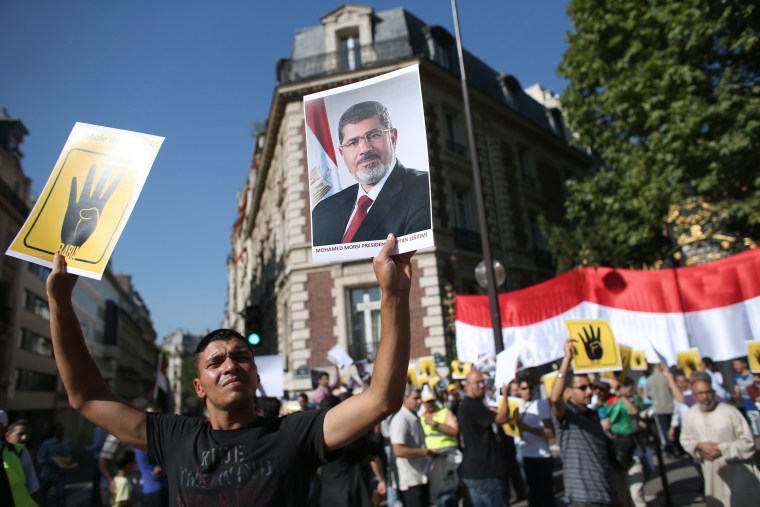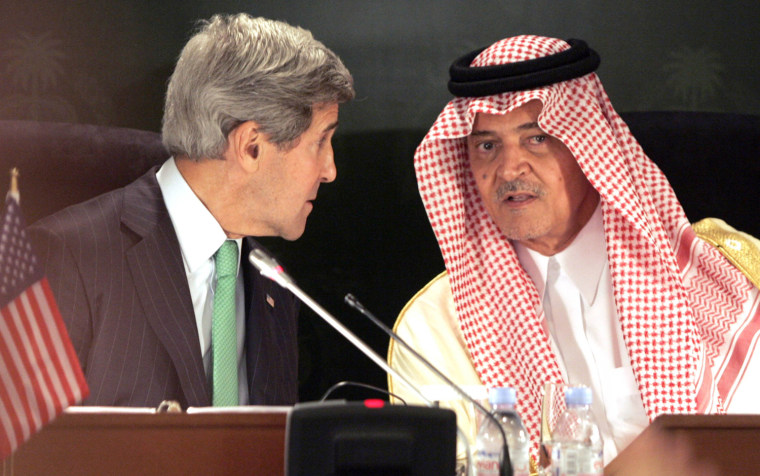
News Analysis
Saudi Arabia's pledge to replace U.S. aid to Egypt that could be cut in the wake of the military's bloody crackdown makes clear the American ally's priority in the Middle East: to keep deposed President Mohammed Morsi's Muslim Brotherhood at bay and its own kingdom secure – even at the risk of stepping on American toes.
"I confirm to everyone, the Saudi Kingdom leaders, government and nation has stood and will forever stand with Egypt and the Arab community will not allow ever to have their fate manipulated or their security and stability tampered with," an official Saudi news agency quoted Saudi Foreign Minister Prince Saud al-Faisal as saying. "As for those who announced that they will stop their support to Egypt or threatened to stop it, for the Arab and Muslim world is rich with its people and capabilities and will not hesitate to offer a helping hand to Egypt."
Saudi Arabia, United Arab Emirates and Kuwait view the Muslim Brotherhood – the Arab world's most influential Islamist movement – as a significant security threat to the region's authoritarian governments.
Saudi Arabia and other Gulf kingdoms have pledged about $12 billion in aid to Egypt since the army toppledthe democratically elected Morsi on July 3.
"[Saudi Arabia] has stood and stands today with our brothers in Egypt against terrorism, deception and sedition," King Abdullah said in a speech on Friday addressing the unrest in Egypt, during which he also praised the country's military leadership.
Experts say it's not surprising to see Saudi Arabia put security concerns in front of diplomacy.
Saudi Arabia "will step in very, very fast when they feel their interests are in danger," said Michael Stephens, a Qatar-based researcher at RUSI, an international security think tank. "The kingdom fears that the Muslim Brotherhood would work to subvert [the Gulf] monarchies region-wide."
Saudi Arabia's promise to Egypt's military leadership was in stark contrast to an announcement by American officials that they were reviewing $1.5 billion in annual aid. Some congressional leaders have pressed the Obama administration to cut aid entirely after violence sparked by raids on pro-Morsi camps killed almost 1,000 people.
In the past, American aid to Egypt has included armored personnel carriers, helicopters, anti-aircraft missiles, surveillance systems, fighter jets and tanks, as well as training. The U.S. has poured more than $70 billion in military and economic aid into Egypt since 1948.

About $1.3 billion of the annual U.S. aid is military, which comes back to the United States in spending on things like tanks and planes.
Still, while Saudi Arabia is openly pouring money into a conflict that the U.S. has refrained from calling a coup – doing so would require cutting all military or financial assistance to the country – at least one expert said it would be wrong to interpret Saudi Arabia and the United States' different reactions to Egypt as a deep split in the relationship.
"The United States may have a broad concern with democracy and human rights. States within the region are more concerned with their security," said Anthony Cordesman, former national security assistant to Senator John McCain and current Arleigh A. Burke Chair in Strategy at the Center for Strategic and International Studies. "The Saudi security-oriented approach does not mean you can't have a partnership."
Cordesman, who has warned against threatening to cut aid to the Egyptians, said the U.S. needs the Saudis "just as much as they need us."
He added: "We are not in charge."
There is still some question as to if and what aid to Egypt may actually be cut.
White House spokesman Josh Earnest said Tuesday that reports that aid to Egypt had been cut off were "not accurate" and that a review of the assistance package by the president's national security team remained under way.
"In early July, the president of the United States directed his national security team to conduct a review of the assistance and aid that we provide to Egypt," Earnest said. "That review that the president ordered in early July has not concluded."
Earnest repeatedly declined to say whether some aid has been suspended as that review continued, arguing that aid is distributed in "tranches" rather than as a constant "flow" of financial assistance.
"We are considering individual tranches of assistance," he added.
NBC News' Zainab Abdul Aziz and Carrie Dann contributed to this report.
Related: